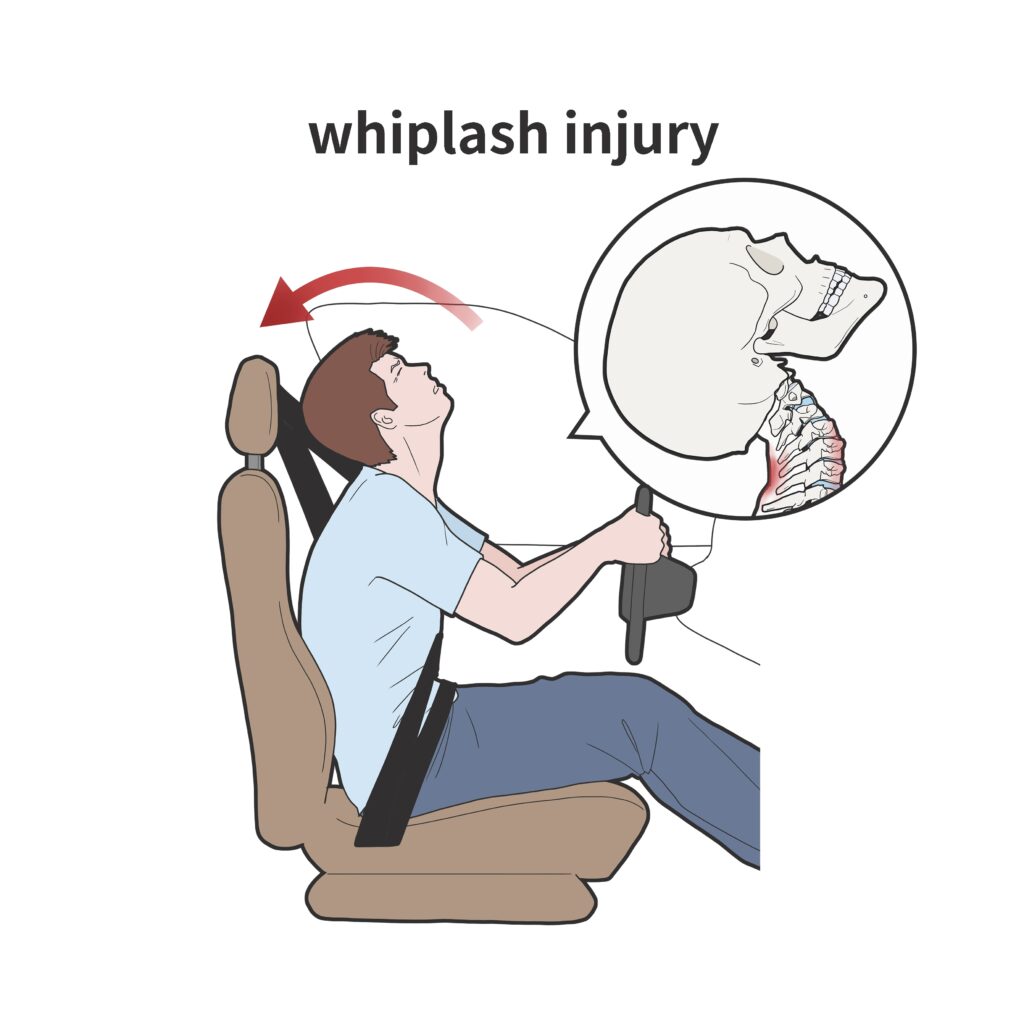If you've been in a car accident and suffered whiplash, you may be wondering how much compensation you might receive by filing a lawsuit.
Whiplash often happens in rear-end car accidents, even at low speeds. While some people recover from whiplash in a few weeks with rest and pain medication, others experience chronic pain, headaches, dizziness, and other symptoms that interfere with work and daily activities.
If someone else's negligence, like distracted driving or speeding, caused your accident and whiplash injury, you may recover compensation for your medical bills, lost income, pain, and suffering. But exactly how much is whiplash worth in a lawsuit?
The answer depends on many factors, and you should discuss your situation with an experienced San Francisco car accident attorney.
Table of contents
Factors That Affect Whiplash Settlement Amounts
Every case is unique, but in general, the value of a whiplash claim is determined by:
The severity of your whiplash injury
More severe whiplash injuries lead to higher settlement payouts. The amount of damage to your neck affects your level of pain, types of symptoms, and how long it takes you to heal.
Minor whiplash may cause neck pain and stiffness for a few days or weeks.
More serious whiplash can also cause:
- Headaches, especially at the base of the skull
- Dizziness
- Blurred vision
- Ringing in the ears (tinnitus)
- Difficulty concentrating or remembering
- Irritability
- Fatigue
- Numbness, tingling, or weakness in your arms
- Pain in your shoulders, upper back, or arms
Severe whiplash may cause some of these symptoms to last several months or even years, especially if there is damage to the nerves, discs or joints in your cervical spine (neck).
Generally, the more painful and long-lasting your whiplash symptoms are, and the more they impact your ability to work and enjoy life, the higher your compensation will be. Permanent injuries are worth the most.
The strength of your negligence case against the other driver

To have a valid whiplash lawsuit, you must prove that the other driver was negligent and at fault for causing the crash. The more evidence you have of their negligence and liability, the stronger your case.
Examples of driver negligence that commonly causes whiplash include:
- Rear-ending your vehicle because they were speeding, following too closely, or distracted driving by their phone
- Running a red light or stop sign and T-boning your car on the side
- Swerving into your lane and sideswiping your vehicle
- Driving under the influence of alcohol or drugs and crashing into you
Police reports, traffic camera footage, witness statements, and photos of the accident scene and vehicle damage can all help prove fault. Your whiplash settlement may increase if you have strong evidence proving the other driver was entirely at fault.
The total amount of your damages
The more losses and expenses you incur because of whiplash, the more your injury claim is worth.
Damages in whiplash cases often include:
- Past and future medical expenses for doctor visits, imaging tests, physical therapy, medications, and other treatments for your whiplash
- Lost income from missing work due to your injuries and medical appointments
- Projected future lost earnings if you have long-term whiplash complications that impact your ability to work
- Pain, suffering, and emotional distress caused by the accident and your injuries
- Loss of enjoyment of life and activities you can no longer do
- Loss of consortium (intimacy and companionship) with your spouse
Whiplash settlement amounts involve your economic damages (medical bills, lost income) and non-economic damages (pain and suffering). In cases of mild whiplash treated with minimal medical care, damages may not be a lot. But severe whiplash requiring extensive treatment and causing disability or chronic pain can entitle you to a six-figure payout.
Whether your case settles or goes to trial
Most whiplash injury claims are resolved through settlements with the other driver's insurance company. Very few end up going to trial before a judge and jury.
Settling a whiplash claim out of court tends to result in faster payouts of guaranteed money. Trials are riskier because there's no guarantee that a jury will favor you. But if the insurance company refuses to offer a fair settlement, you may need to take your case to court to get sufficient compensation.
Your whiplash case is more likely to settle if you have obvious injuries, strong evidence of the other driver's fault, and your demand for damages is reasonable.
But if questions arise about the severity of your whiplash, who caused the crash, or if your claimed damages seem excessive, the insurer may dig in their heels and fight harder, forcing a trial.
Tips to Maximize Your Whiplash Settlement
If you sustained whiplash in an accident caused by someone else, to build a strong injury case and improve your odds of receiving maximum compensation:
See a Doctor Right Away and Follow Their Orders
One of the most important things to do after getting whiplash in an accident is to get medical attention quickly. Don't wait to see if your pain goes away on its own. Go to a hospital, urgent care clinic, or your regular doctor as soon as possible to get checked out.
Whiplash can cause different symptoms in different people. Some may have severe neck pain and headaches right away. Others may not feel much pain at first but wake up sore and stiff the next day. Even if you think your whiplash is mild, it's still important to get a professional medical opinion.
The doctor will examine you and may order imaging tests like X-rays or an MRI to check for damage to the bones, joints, discs, ligaments, and nerves in your neck. Then, they'll recommend a treatment plan. This may include rest, ice/heat, pain medication, muscle relaxers, physical therapy, and follow-up visits.
You must follow all of your doctor's treatment recommendations closely. Go to all your appointments and do any recommended at-home exercises. If you skip treatment or let too much time pass between doctor visits, the insurance company may argue that your whiplash must not be that serious and try to deny your claim.
The medical records generated from your timely treatment will serve as key evidence of the extent of your whiplash injury and its impact on your life. So don't delay or avoid getting the care you need. It's essential for both your health and your legal case.
Keep Track of All Whiplash-Related Expenses
Whiplash from a car accident can lead to a lot of unexpected expenses. It's important to keep careful records of all the costs you face, both for your own information and to show the insurance company the full extent of your financial losses when you make your claim.

Medical bills may constitute the largest chunk of your expenses. Keep copies of all bills and receipts.
You may also miss time from work because of your whiplash pain and medical appointments. Keep track of all the days and hours of work you miss, and get documentation from your employer of your normal income and the amount of income you lost.
Other costs may include transportation to doctor visits, help with household services you can't do because of your injury, or cancellation fees for missed trips or events. Keep receipts for these out-of-pocket expenses.
Organize all your records and keep them in a folder or digital file so you have them readily available when it's time to submit your whiplash claim. The more documentation you have of your financial losses, the better. Your attorney can use this information to fight for a higher settlement.
Be Careful When Talking to the Other Driver's Insurance Company
After a car accident, you can expect to hear from the other driver's insurance company pretty quickly. They may call you within hours or days of the crash. Let your lawyer protect your rights and field these conversations.
The insurance adjuster may seem friendly and concerned about your well-being at first. But their ultimate goal is to pay as little money as possible on your whiplash claim. And they know that getting you to make certain statements on record can give them ammunition to minimize or deny your payout.
The adjuster will likely ask you to give a recorded statement describing what happened in the accident and your injuries. They may try to get you to say something that makes it sound like the crash wasn't all their insured's fault or that your whiplash isn't that bad.
It's best to politely decline to give a recorded statement. You're not legally required to do so. Instead, give them your lawyer's contact information and tell them that further communication should go through your attorney.
If you don't have a lawyer yet, stick to only the basic facts in any conversation with the other driver's insurance company. Don't give opinions, guess, or elaborate. Don't say "I'm sorry" or anything they might interpret as admitting fault.
And don't discuss your whiplash symptoms or medical treatment in detail. Just say that you're getting treatment for your injuries and leave it at that. Let your lawyer handle the negotiations over your medical records and damages later on.
Anything you say to an insurance adjuster can be used against you. So the less you say, the better. Leave the talking to an experienced car accident attorney who knows how to deal with insurance companies and protect your rights.
Don't Jump at the First Whiplash Settlement Offer
When you file a whiplash injury claim with the other driver's insurance company, they'll eventually make a settlement offer. This initial offer may come quickly before you even complete medical treatment. As tempting as it may be to accept fast cash, be very wary of any first offers.
Insurance companies know that many car accident victims are stressed about medical bills piling up and missing work. They may dangle a speedy settlement check in the hopes that you'll bite and sign away your rights before you know the full extent of your losses.
In reality, first settlement offers for whiplash claims are almost always lowballs. They typically won't include enough money to cover all your medical expenses to date, let alone any future treatment you may need if your neck pain lingers. There likely won't be anything for lost income or pain and suffering damages either.
If you accept a lowball settlement and need a lot more medical care, you'll be out of luck. Once you sign the settlement paperwork, that's it. You can't go back to the insurance company and ask for more money later.
That's why having an experienced whiplash attorney review any settlement offer you receive is so important. They can estimate the full value of your claim—including future damages—and negotiate with the insurer for an amount that fairly compensates you.
Your lawyer may need to submit additional evidence and go back and forth with the adjuster several times to get the offer up to a reasonable number. Your attorney may advise filing a lawsuit if the insurance company won't budge. The threat of going to court and the risk of a jury verdict may be enough to convince them to offer a better settlement.
Watch Out for Lawsuit Filing Deadlines
When you're dealing with whiplash pain and trying to navigate an injury claim, it's easy to lose track of time. But if you wait too long to take legal action, you can miss your chance to get any compensation at all.
Every state has a law called the "statute of limitations" that puts a strict deadline on your right to file a personal injury lawsuit. In most states, you have just one to four years from the car accident date to start your lawsuit in the state's civil court system. If you try to file your case even one day after the deadline, the court will likely throw it out.
Remember that the statute of limitations applies to filing lawsuits, not insurance claims. You can technically file a whiplash claim with the other driver's insurance anytime. But once the statute of limitations passes, you'll lose your leverage with the insurance company.

Insurers know you can't take them to court if settlement negotiations break down after the filing deadline. So they'll have little motivation to offer you a fair payout since your only options will be to accept whatever lowball amount they offer or walk away empty-handed.
To protect your rights, the best thing to do is hire a car accident lawyer to handle your whiplash claim well before the statute of limitations deadline. If the insurance company refuses to make a reasonable settlement offer, your lawyer will have plenty of time to prepare a strong court case and file it by the cutoff.
Even if you're confident you can settle your claim without a lawsuit, you never know what the future holds. The insurance company can dig in its heels. Your whiplash injury can take an unexpected turn for the worse. It's always better to keep your options open by leaving enough time to file in court if needed.
Contact a Car Accident Lawyer to Discuss the Value of Your Whiplash Case
You shouldn't have to bear the physical, emotional, and financial burdens of whiplash because of someone else's negligence. If you suffered an injury in a crash, consult a knowledgeable San Francisco personal injury attorney who can protect your rights and fight to get you the full and fair compensation you deserve.
The sooner you contact a lawyer, the better your odds of a successful whiplash claim. Most attorneys offer free case evaluations, so there's no cost to get a trusted legal opinion on your options. Contact a car accident lawyer near you today to discuss the value of your whiplash injury case and the next steps for pursuing justice.


